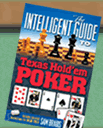Poker variants fall into two broad categories-flop games and board games. Here is brief summary of the popular games.
Flop Games
Flop Games are poker variants in which players receive face-down cards that they combine with common "community" cards, to form their hands. Betting structures for these games include limit, pot-limit, and no-limit. Flop games include:
Texas Holdem: By far the most popular poker game in the world. Players receive two "pocket" cards each on the deal, which is followed by a round of betting. Three community cards are then exposed (the "flop") followed by another round of betting. There is a round of betting after exposure of a fourth community card and a final round of betting after a fifth community card. If more than one player remains after the four rounds of betting are complete, the player with best five-card hand out of seven cards total (two pocket cards plus five community cards) wins.
Omaha: A flop game with the same betting structure as Texas Hold'em. The difference is that each player receives four pocket cards on the deal. After all four rounds of betting there will again be five community cards available. However, a player's five-card hand must include three and only three of the community cards combined with two and only two of the four pocket cards. This rule can be confusing for players. Unlike in Texas Hold'em, Omaha players do not have the option of playing four or all five of the community cards.
Omaha High-Low: A split-pot game structured identical to Omaha, with each player receiving four pocket cards to combine with the community cards. The same restriction that three of the community cards must be used applies. However, in Omaha High-Low the highest ranked hand splits the pot with the lowest ranked hand. The best high hand is formed exactly as in Omaha, but two pocket cards are also used to form the player's lowest hand. The pocket cards used for the low-hand can be different (or the same) from the cards used for the high hand. Omaha High-Low is almost always played with an eight-or-better "qualifying" rule for low. That means the low hand cannot have a card higher than an 8 to win the low-pot. If no low-hand "qualifies" for the low-pot, the high hand wins it all. Straights and flushes do not count in determining the low-hand, which means that a 5-high straight is the best possible low-hand.
Board Games
Board Games are poker variants in which no cards are shared. A mixture of face-down and face-up cards are dealt that belong only to the player receiving them. The most popular online board games are seven-card games, and always have limit betting structures. Board games include:
Seven-Card Stud: One of the most familiar variants of poker. On the deal, each player receives two cards face-down and one card face-up. A round of betting, known as Third Street, follows. Each remaining player receives a fourth card face up and a round of betting ---Fourth Street--follows. The process repeats-a face-up card followed by a betting round-for the fifth and sixth cards. The final seventh card is dealt face-down and a final betting round, Seventh Street, occurs before the showdown. The player with the best five-card hand, out of the seven cards the player received, wins the entire pot.
Razz: This is a seven-card game that is dealt and structured exactly like Seven-Card Stud. The difference is that at showdown, the player with the lowest hand wins the entire pot. There is no qualifying rule for low. Straights and flushes do not count when determining the low hand, which means that a 5-high straight is the best possible Razz hand.
Seven-Card Stud High-Low: A split-pot game structured identical to Seven-Card Stud. At showdown, the highest hand splits the pot with the lowest hand. As in Omaha High-Low, there is an eight-or-better qualifying rule for winning the low-pot. If no hand qualifies for the low-pot, the high hand wins it all. Like Omaha High-Low and Razz, straights and flushes do not count when determining the low-hand.

